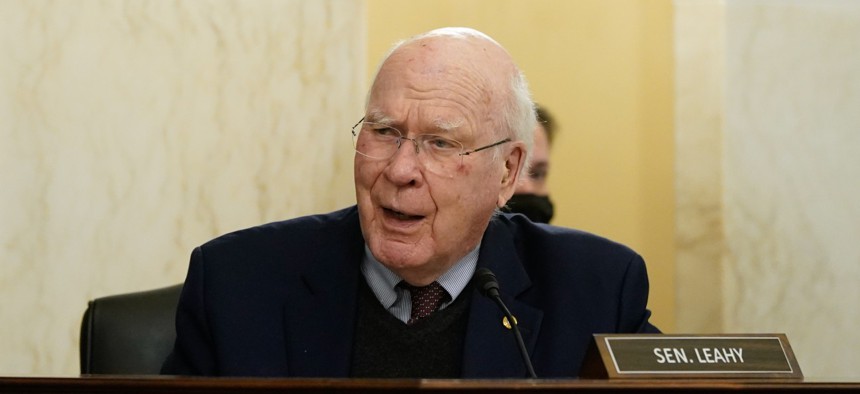
Senate Appropriations Committee Chairman Patrick Leahy, D-Vt., along with his House counterpart, expressed optimism about reaching a spending agreement. Elizabeth Frantz-Pool/Getty Images
Top Lawmakers Hold 'Constructive' Meeting on 2022 Funding as Another Stopgap Shutdown-Avoiding Measure Looms
Biden administration warns of drastic impacts if Congress resorts to another continuing resolution.
Lawmakers on Thursday sounded a rare note of optimism about reaching a spending agreement for the remainder of fiscal 2022 as they look to avoid yet another stopgap measure.
Leaders in both parties called a bicameral, bipartisan meeting “constructive,” saying they shared the goal of setting full-year appropriations by their Feb. 18 deadline. Agencies are currently operating under a continuing resolution to which Congress agreed in December, and this is their second time doing so in the fiscal year.
“We appreciated the opportunity to have a constructive Four Corners conversation today on completing fiscal year 2022 appropriations,” Appropriations Committee chairs Sen. Patrick Leahy, D-Vt., and Rep. Rosa DeLauro, D-Conn. said in a joint statement, referring to the top Democrat and Republican on their panels in each chamber. “We look forward to further conversations in the coming days, with the shared goal of finishing our work by the Feb. 18 government funding deadline.”
Blair Taylor, a spokeswoman for Sen. Richard Shelby, R-Ala., the top Republican on the spending committee, shared a similar outlook.
“They had a constructive conversation and plan to continue working to find a path forward on fiscal 2022 appropriations bills,” Taylor said.
Shelby also cautioned, however, that negotiators still had significant detail to sort out and said another CR was “looming,” according to a CNN report. The cautious optimism came just one day after appropriators squabbled during a hearing on the negative impacts that more stopgap spending bills would have on the Defense Department.
“There has not been a single piece of paper outlining what it is that our colleagues on the other side of the aisle would like,” DeLauro said. “There has to be a discussion.”
Rep. Kay Granger, R-Texas, the top Republican on the appropriations panel, countered that her party had made an offer and Democrats had just not liked it.
“Republicans will not allow the majority to ram through irresponsible spending and harmful policies in other parts of the government by using the Department of Defense as a political weapon,” Granger said.
Military leaders on Wednesday warned of canceled bonuses, delayed modernization plans and postponed investments in equipment and training under a year-long CR. The White House previously said such an outcome would negatively impact the COVID-19 pandemic response, national security and federal hiring. Pay increases would have to come at the expense of other priorities, it said, while the Social Security Administration would institute a hiring freeze, vacancies for food safety inspectors would go unfilled, NASA’s Mars program would be shortchanged and efforts to combat climate change would be unfunded.
Talks over spending bills remain at a standstill until negotiators can set top-line funding for the defense and non-defense parts of the budget, and then for each of the 12 spending bills Congress must pass each year. Senate Democrats have proposed to boost spending at civilian agencies by 13%, nearly matching the 16% called for in President Biden’s budget request. Defense spending would increase by 5% under their plan, which Republicans have called insufficient.







